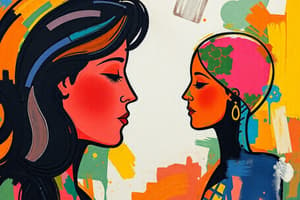Podcast
Questions and Answers
According to bell hook's "Reconstructing Black Masculinity," what is the portrayal of women in black male phallocentric ideology?
According to bell hook's "Reconstructing Black Masculinity," what is the portrayal of women in black male phallocentric ideology?
- Equal and deserving of respect
- Immoral and incapable of reason (correct)
- Rational and capable of reason
- Smart and independent
According to bell hook's "Reconstructing Black Masculinity," what is the message conveyed through the film Harlem Nights?
According to bell hook's "Reconstructing Black Masculinity," what is the message conveyed through the film Harlem Nights?
- Black men are tough, violent, and willing to assert power (correct)
- Black men are peaceful and non-violent
- Black men are submissive and passive
- Black men are cowards who cannot confront racist white males
What is the characteristic of the black male identity portrayed in Harlem Nights?
What is the characteristic of the black male identity portrayed in Harlem Nights?
- Submissive and passive
- Tough, violent, and willing to assert power (correct)
- Rational and empathetic
- Peaceful and non-violent
According to bell hook's "Reconstructing Black Masculinity," what is the impact of black male phallocentrism on black women?
According to bell hook's "Reconstructing Black Masculinity," what is the impact of black male phallocentrism on black women?
According to bell hook's "Reconstructing Black Masculinity," what is the primary critique of Spike Lee's film Mo' Better Blues, according to the text?
According to bell hook's "Reconstructing Black Masculinity," what is the primary critique of Spike Lee's film Mo' Better Blues, according to the text?
What is bell hooks' stance on black male complicity in perpetuating patriarchal ideals?
What is bell hooks' stance on black male complicity in perpetuating patriarchal ideals?
What is bell hooks' critique of the conventional portrayal of black women in film?
What is bell hooks' critique of the conventional portrayal of black women in film?
What is bell hooks' primary concern regarding the representation of black masculinity in film?
What is bell hooks' primary concern regarding the representation of black masculinity in film?
According to bell hook's "Reconstructing Black Masculinity," what is the primary goal of the black liberation struggle, according to cultural nationalists?
According to bell hook's "Reconstructing Black Masculinity," what is the primary goal of the black liberation struggle, according to cultural nationalists?
What is bell hooks' critique of black men's response to sexism?
What is bell hooks' critique of black men's response to sexism?
According to Ed Guerrero's "Be Black and Buy," what is evident of the 'new black film wave' in Hollywood?
According to Ed Guerrero's "Be Black and Buy," what is evident of the 'new black film wave' in Hollywood?
According to Ed Guerrero's "Be Black and Buy," what has been the common aim among black filmmakers?
According to Ed Guerrero's "Be Black and Buy," what has been the common aim among black filmmakers?
According to Ed Guerrero's "Be Black and Buy," what was the focus of early black films, such as The Realization of a Negro's Ambition and The Birth of a Race?
According to Ed Guerrero's "Be Black and Buy," what was the focus of early black films, such as The Realization of a Negro's Ambition and The Birth of a Race?
According to Ed Guerrero's "Be Black and Buy," what is the implication of the shift from 'be black and die' to 'be black and buy'?
According to Ed Guerrero's "Be Black and Buy," what is the implication of the shift from 'be black and die' to 'be black and buy'?
According to Ed Guerrero's "Be Black and Buy," what is a common route taken by independent film-makers, regardless of orientation?
According to Ed Guerrero's "Be Black and Buy," what is a common route taken by independent film-makers, regardless of orientation?
In "Be Black and Buy" what does Spike Lee say about the current state of being an African-American filmmaker?
In "Be Black and Buy" what does Spike Lee say about the current state of being an African-American filmmaker?
Flashcards are hidden until you start studying
Study Notes
The Exclusion of Women
- The refusal to perceive females as persons is a conceptually profound exclusion that affects how females are treated and perceived in society.
- This exclusion is sustained by an active manipulation of circumstances that is systematic, habitual, and unacknowledged.
Phallocentrism and Black Masculinity
- Black male phallocentrism constructs a portrait of woman as immoral, irrational, and incapable of reason.
- This representation of womanhood suggests that women have no knowledge to share and do not deserve respect or listening ears from men.
- The film Harlem Nights reinforces this phallocentric representation, portraying black men as tough, violent, and willing to assert power over women.
The Objectification of Women
- In the film, the nightclub represents a world outside the home where creativity and uninhibited eroticism flourish, but this world is also one of risk and objectification.
- Indigo, a female character, becomes the vessel for the reproduction of Bleek, a black man, through having a son.
- Self-effacing, Indigo identifies Bleek's phallocentrism, but ultimately rescues him, and her actions reinforce the notion that women are responsible for redeeming men.
Black Male Sexism and Accountability
- Despite individual black women critiquing black male sexism, many black men continue to act as though sexism is not a problem in black life.
- Black men often blame racism rather than acknowledging and addressing their own sexism and phallocentrism.
- Cultural nationalism and the struggle for black liberation are often seen as a struggle to recover black manhood, rather than addressing the oppression of women and children.
Black Masculinity and Emotional Vulnerability
- Contrary to the phallocentric representation of black masculinity, the film shows that black men are in need of love and care from females.
- Quick, a character in the film, demonstrates emotional vulnerability and a willingness to share, but is ultimately rejected and humiliated.
Black Sexual Politics and Complicity
- The notion that black women are complicit with white patriarchy and betray black men is a fixed idea in the minds of many black men.
- This idea is rooted in historical ignorance, as historical documents show that black women have typically acted in solidarity with black men.
- Black men who advance this notion of complicity often deny their own complicity in perpetuating sexism and patriarchy.
Historical Context of Black Independent Cinema
- In the US, all aspects of black life were socially and institutionally segregated, creating a stable market for black independent cinema.
- The early black film-makers aimed to portray black humanity honestly, contrasting with Hollywood's dehumanizing stereotypes.
Rise of Black Film-Makers and Actors
- A number of rising black film-makers have contributed to the 'new black film wave', including Spike Lee, John Singleton, and Gary F. Gray.
- The success of films like Do the Right Thing, Boyz N the Hood, Friday, and Waiting to Exhale has marked a shift in the industry.
- Black actors and movie stars, such as Denzel Washington, Halle Berry, Wesley Snipes, Samuel L. Jackson, and Angela Bassett, are finding work in the industry.
Changes in Black Audience and Consumer Culture
- The black audience has mutated, recognizing themselves as a complex, heterogeneous social formation.
- African Americans now engage with pressing issues of color, caste, class, interracial romance, and sexual orientation.
- The black audience, as consumers, is increasingly enlightened and colonized, shifting from 'be black and die' to 'be black and buy'.
Evolution of Black Film-Making
- Black film-makers have expressed a common aim to portray black humanity honestly, from early rebuttals of The Birth of a Nation to present-day films.
- The new black film-makers are subtly shifting the terrain of the contest for popular representation of blackness by taking their depictions to higher levels.
- As Spike Lee proclaimed, "There has never been a better time to be an African-American film-maker."
Studying That Suits You
Use AI to generate personalized quizzes and flashcards to suit your learning preferences.




